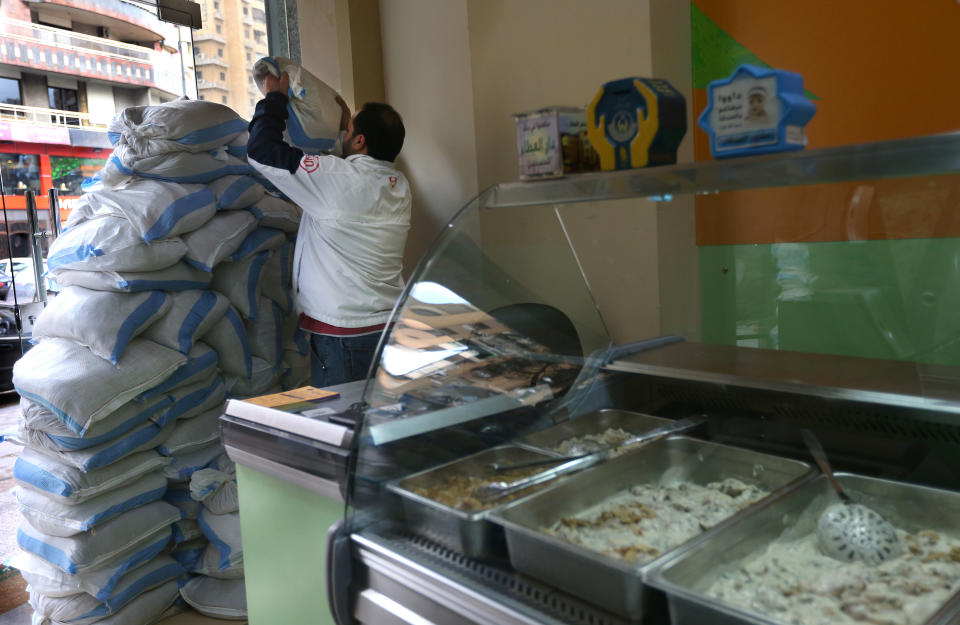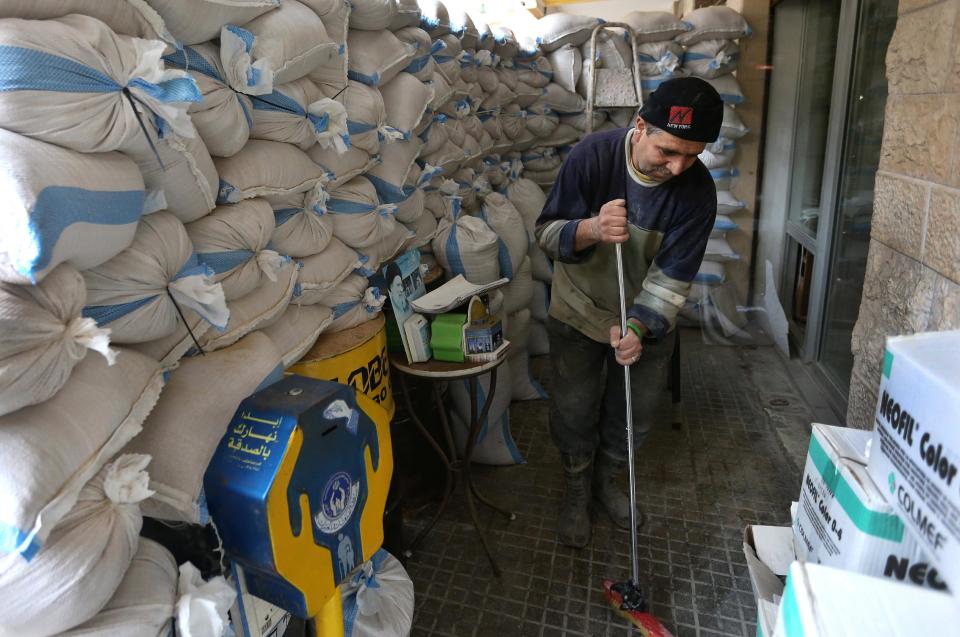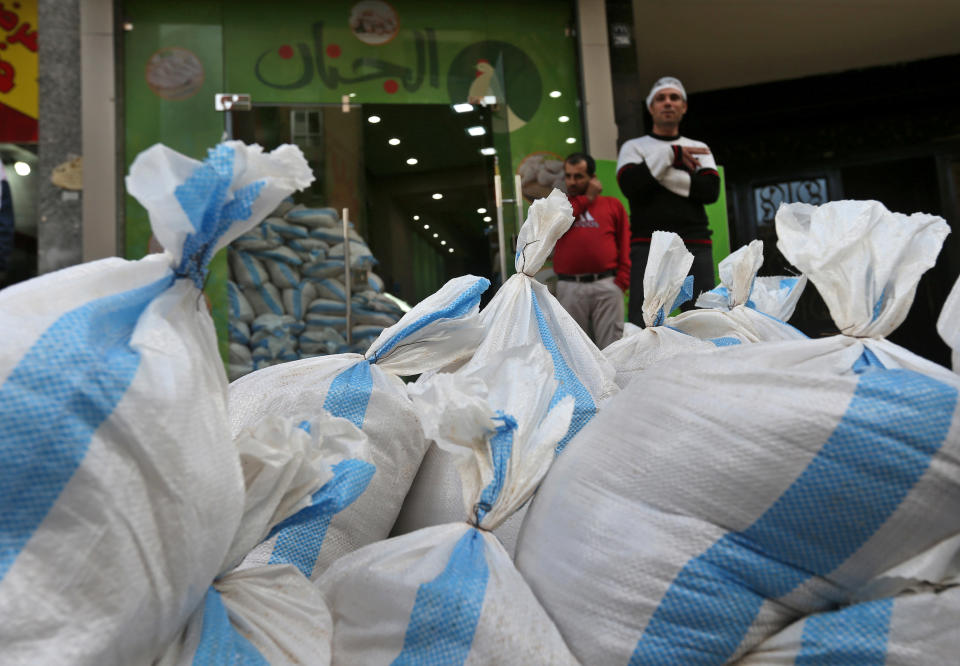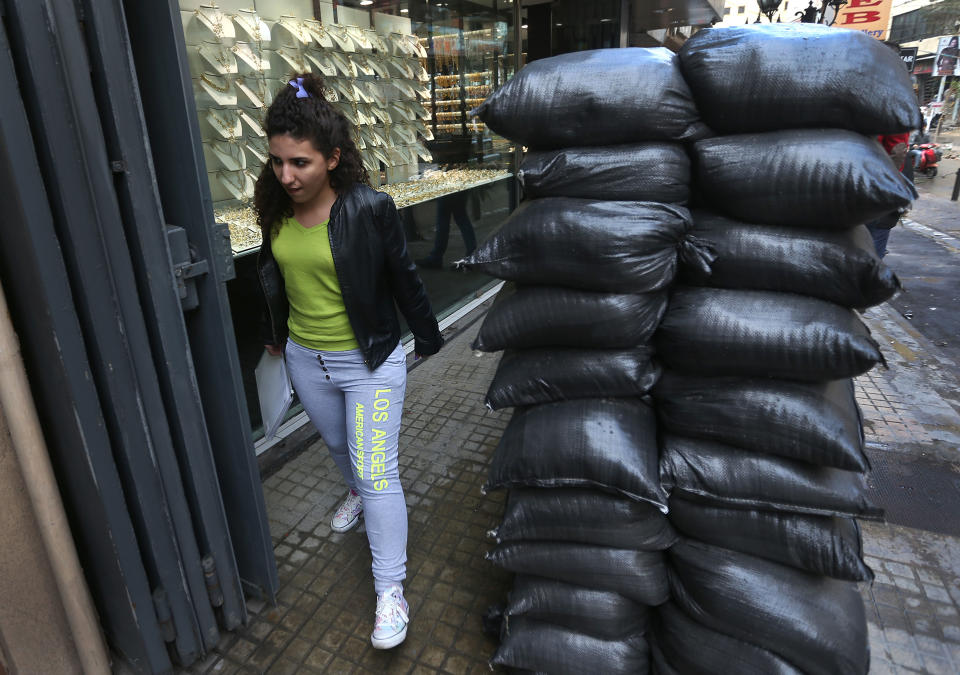Beirut suburb on high alert after wave of bombings
BEIRUT (AP) — Mohammed Hussein has stacked 300 sandbags outside his coffee shop in Beirut's southern suburbs to reassure customers frightened by a wave of deadly bombings there, but business is still down by half.
The once-bustling Shiite suburb's streets are quiet and its residents on high alert after a series of six blasts, the first of which was in July, killed at least 57 people. They are blamed on Sunni radicals, retaliating against Hezbollah for sending its troops to fight in Syria's civil war by attacking the Lebanese Shiite militia's base of support.
Hussein, 25, is one of many shop owners in the area, also known as Dahiyeh, who have been fortifying their institutions and banning unknown cars from parking in front of them for fear of blasts.
"Our coffee shop is on the road and no one knows when there will be an explosion," said Hussein, as he stood in front of the green sandbag barrier protecting his empty VIP Coffee Lounge in the Haret Hreik neighborhood, one of the hardest hit.
Attacks on the area began nearly two months after the militant Hezbollah group openly sent its battle-hardened fighters into Syria to help President Bashar Assad's forces. Assad belongs to the minority Alawite sect, an offshoot of Shiite Islam, while most rebels are Sunnis. Hezbollah's support helped turn the tide of battle in some parts of the country.
Syrian militant groups vowed to keep striking in Hezbollah's strongholds in Lebanon until the group pulls out its fighters, but Hezbollah leader Sheik Hassan Nasrallah has vowed not to change his policy toward Syria. Hezbollah calls itself the "Resistance" — a throwback to its many battles with Israelis — and takes pride in defiance.
Four of the six bombing attacks were carried out by suicide attackers making it more difficult for Hezbollah and Lebanese authorities to prevent them. The deadliest, carried out by two suicide attackers, targeted the Iranian embassy on Nov. 19 and killed 23 people including a diplomat. The last explosion, which hit Haret Hreik on Jan. 21, killed four.
DNA tests identified three of the suicide attackers. They turned out to be residents of Lebanon and joined militants in Syria before returning home to carry out the attacks. The others have not been identified yet.
Several of the attacks were claimed by the al-Qaida-linked Abdullah Azzam Brigades whose leader was captured by Lebanese authorities in December and died in custody later month. Another one was claimed by the al-Qaida-inspired Nusra Front in Lebanon. It warned Sunnis this week to stay away from areas dominated by Shiites, saying it intends to again attack strongholds of Hezbollah.
On Thursday, the Lebanese army said in a statement that military intelligence referred to judicial authorities a Sunni cleric, Omar al-Atrash. It said he confessed that he transported cars rigged with explosives to Beirut and ferried suicide bombers to and from Syria. A lawyer for al-Atrash could not immediately be identified.
On Wednesday, an Associated Press team went on a tour in Dahiyeh where Hezbollah member wearing baseball caps and yellow armbands stood on street corners with walkie-talkies in their hands watching passing cars and pedestrians.
Building supervisors throughout the area were told to inform the nearest Hezbollah post about any cars that park and don't belong to someone they know.
Army and police checkpoints at all entrances of Dahiyeh stopped vehicles and looked inside before allowing them to proceed. Trucks were asked to park for a more thorough search, as were cars with only a driver — the idea being that suicide bombers are unlikely to carry passengers.
"The measures make us feel safe and all the time there are men on the roads looking at cars coming and leaving and the shops and the cars that park in front of them," said Hussein al-Maqhour, 21, an employee at a jewelry shop. "There have been some concerns after the bombings but our will is stronger than all these acts," he said.
But the near-empty streets were a far cry from the traffic jams and busy markets before the bombing.
Hassan Sharafeddine and his employees now work inside his construction material shop behind a sandbag barrier. An explosion across the street sprayed his shop with shrapnel but wounded no one inside.
"People are taking precautionary measures and some are not going out much," said Sharafeddine — although he himself has been able to increase business by making sandbags. "Despite all that happened I believe there will be more attacks," he said.
But Hassane Ghamloush is more confident, estimating that the sandbags outside his jewelry store were "70 to 80 percent" effective.
"We are people who back the Resistance, and no matter what (our enemies) do to us, they will not change us," he said.






